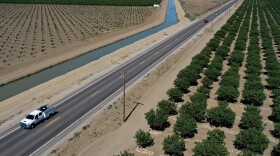The surging San Joaquin River is proving to be another tough water management problem. The raging waters from this year’s historic rain and snowpack are seeping through levees, destroying crops and threatening the city of Firebaugh.
The small city of Firebaugh in Fresno County, sits right up against the river. Seepage is the major problem, said Ben Gallegos, Firebaugh City Manager.
“It’s been wet so long that now it’s seeping through the ground,” said Gallegos. “We’re finding water in our basements.”
Water is seeping into the basement of the new police department, which sits two football fields in length away from the river, said Gallegos. Water is also coming into some homes, but for the time being is getting pumped out, he said.
Gallegos is hoping the levees hold as water continues to gush in through the summer. There isn’t nearly enough funding to do necessary levee repairs, he said.
The city commissioned a study last summer to pinpoint the low points in the levees and estimate repair costs. It would cost about $140 million to do the needed repairs, said Gallegos. It’s not something the city can afford as the entire city budget is only $3 million to $4 million per year, he said.
“It’s a concern,” said Gallegos. “I’m praying that nothing happens.”
For a couple weeks, releases from Friant Dam into the river were at 10,000 cubic feet per second. That’s 2,000 cfs over the channel capacity of the river, said Shane Swartz, general manager of the Lower San Joaquin Levee District. The district is a local agency as part of the Central Valley Flood Protection Board. On June 6, flows were cut back to 8,000 cfs.
The San Joaquin seepage isn’t only threatening homes. It’s also destroying crops.
“Long term exposure of water on top of these levees, that’s not a good thing,” said Swartz.
Hundreds of acres of crops on both the Madera and Fresno County sides of the levees have been inundated with water seeping through from the river, said Swartz.
That land can’t be planted this year, he said. Some crops, such as alfalfa and hay, were already planted and are now ruined, he added.
The levee district has responded to five major emergencies so far, where water caused severe erosion of the levees, said Swartz. In those cases, levees were losing about a foot of height per day, he said.
The county and the California Governor’s Office of Emergency Services took over for those instances and initiated emergency repairs.
In the meantime, the district has patrols on 24-7 duty keeping watch over its 92 miles of levees, said Swartz.
So far, with cooler weather helping slow the snow melt, the fears of worse flooding haven’t been realized, said Swartz. But people are still worried about a heat wave, he said.
Part of the challenge is how much water is coming in from the Kings River. The North Fork Kings River joins the San Joaquin in the Mendota Pool.
The North Fork has been hitting its maximum flows for a while now, said Chris White, executive director of the San Joaquin River Exchange Contractors Water Authority.
“What that does is it limits the amount of flood space that’s available in the pool and downstream of the pool,” said White. “As you turn the corner and go north along the San Joaquin River, there’s a swath of ground there that’s adjacent to the river on both sides. It’s pretty well saturated. And the issue is that the longer that saturation goes on the more leakage and so forth you see.”
SJV Water is a nonprofit, independent online news publication covering water in the San Joaquin Valley. Lois Henry is the CEO/Editor of SJV Water. She can be reached at lois.henry@sjvwater.org. The website is www.sjvwater.org




